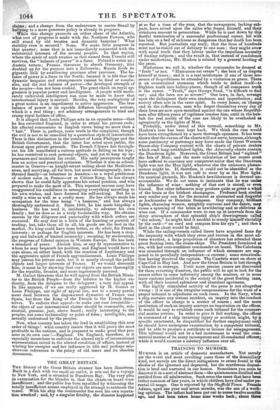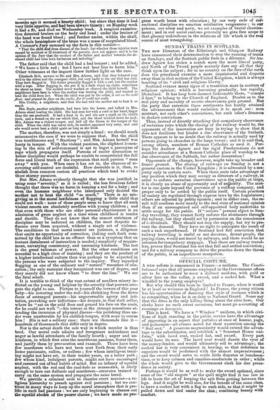TRAINING TO MURDER.
MURDER is an article of domestic manufacture. Not merely are the worst and most revolting cases those of the domiciliary kind, not merely are the direct instigations to crime found in the abodes of the ignorant and depraved, but the murderous disposi- tion is bred and nurtured in our homes. Sometimes you seem to discover it in a sort of abstract form—the quintessence distilled and purified from all adulteration. Such seem the cases that have been rather common of late years, in which children have died under pa- rental ill-usage. Oue is reported by the Sheffield Times. Francis Adams, aged one year and seven months, was the son of a work- ing optician. - The infant had been put out to nurse twelve months ago, and had been taken home nine weeks back ; about three months ago it seemed a hearty child; but since that time it had very little appetite, and had been always thirsty ; on Monday week it had a fit, and died on Wednesday week. A surgical examina- tion detected bruises on the body, and head ; under the bruises of the head was found blood ; and further under, within the skull, the whole hemisphere of the brain was a mass of coagulated blood. A Coroner's Jury summed up the facts in this verdict-- " That the child died from disease of the head ; but whether those injnries were caused by accident or ill-treatment of the parents, does not appear; and it is the opinion of the Jury that the conduct of the father and mother towards the de- ceased child had been both barbarous and unfeeling."
The father said that the child had a bad temper ; and he added, " We have a little rod ; but I have not beat him to harm him." Other witnesses at the inquest threw further light on the case.
Elizabeth Holt, servant to Mr. and Mrs. Adams, said that they behaved very well to the oldest and the youngest child, but very badly to the one that has They both flogged it. The father generally flogged it with a rod, but the mother with a rope. After flogging it, she put it in a dark closet up stairs, sometimes for about an hour. The mother never washed or cleaned the child herself. The neighbours have been in when the mother was beating the child, and wanted to take the child from her. When the child was put in the cellar, it sat on the cold floor, and grazed its face on the coals; for it could not walk. Mrs. Crosby, a neighbour, said that she had told the mother not to beat it so much.
Mrs. Boyle, another neighbour, had been into the house, and talked to Mrs. Adams about beating the child. She had seen her with a cord iu her hand, larger than the one produced. It had a knot in it; and she saw a mark on the child's neck, and a wound on the ear which bled, and the blood trickled down its neck. Mrs. Adams was a violent temper, and laid all the blame to the temper of the child. When the child was taken sick, its mother appeared very sorry, and said she would never beat a child again as long as she lived.
The mother, therefore, was not simply a fiend : we should much misconceive the case if we were to suppose that. But the child was troublesome and " fractious "; and Mrs. Adams herself was hasty in temper. With the violent passions, the slightest loosen- ing to the rem of self-command is apt to beget a paroxysm of rage which propagates itself. Persons of cooler disposition or better discipline would perhaps be unable to comprehend the full force and literal truth of the expression that such passion " runs away." with you. When once it has set in, the chances of re- covering self-control are doubtful. How desirable is it, then, to abolish from common custom all practices which tend to evoke those stormy passions. But Mrs. Adams evidently thought that she was justified .in using some "severity," as it is called ; the less ferocious father thought that there was no harm in keeping a rod for a baby ; and even the humane neighbour who interposed only desired the mother not to beat the child "so much." There is no mis- giving as to the moral lawfulness of flogging a-little child that could not walk : none of these people seem to know that all such violent resorts are absolutely needless with young children ; and that even with those who are older personal chastisement is an admission of gross neglect at a time when childhood is tender and ductile. They do not know that the utmost strictness of discipline may be enforced on children, the most despotic in- fluence over them acquired, without a single act of violence. The conditions to that moral control are patience, a diligence that omits no opportunity of correction, (taking each fault com- mitted by the child less as an offence than as a symptom that an instant instalment of instruction is needed,) simplicity of require- ment, unvarying consistency, and unceasing kindness. The last is the great talisman of power. But the other conditions are essential to a high class of training; and they are the product of a higher intellectual culture than was perhaps to be expected in the persons who were subjected to the inquiry. They regarded flogging as one of the ordinary and " normal ' resources of edu- cation; the only restraint they recognized was one of degree, and they merely did not know where " to draw the line." We see the fatal result.
It is terrible to think of the vast extent of needless misery in- flicted on the young and helpless by the severity that parents arro- gate the right to use. Picture to yourself the terrors of this poor baby—his cowering under the rod—his shrinking from the fierce faces of estranged parents—his ungovernable agony and irri- tation, provoking new inflictions—his despair, in that dark cellar, where he " sat on the cold floor and grazed his fate on the coals, for he could not walk "—his terrors at the strange sensations at- tending the incursion of physical disease—his perishing thus un- der woes unutterable by his childish tongue, with none to rescue him l His is not a solitary case; there are thousands like it—. hundreds of thousaands that differ only in degree. Nor is the actual death the sole way in which murder is thus bred. Our moral code admits and recognizes unkindness and anger as lawful attendants of the family hearth ; anger and un- kindness, in which first arise the murderous passions, foster them, and justify them by provocation and example. There have been few murderers who have not been sent forth from their early home passionate, sullen, or callous ; few whom intelligent train- ing might not have set, in their tender years, on a better path ; few whom kind, indulgent parents, might not have encouraged and caressed out of bad habits of mind. But an infancy of squalid neglect, with the rod and the coal-hole as accessories, is likely enough to turn out dullards and murderers—creatures trained to carry the same system and propagate the same breed.
e provide a criminal code to chastise overt murder—a re- ligious hierarchy to preach against evil passions ; but we con- tinue in many ways to keep up the moral atmosphere that is pro- lific in such bad passions : we are only beginning to cleanse out the squalid abodes of the poorer classes ; we have made no pro- gress worth boast with education ; by our very code of con rectional discipline we sanction retributive vengeance& ; in our prisons, our army sad navy, we set examples of brutal chastise- ment; and in our social customs generally we give free scope ni that gloomy unkindness in the relations of life which is the real source of most wrongdoing.



























 Previous page
Previous page